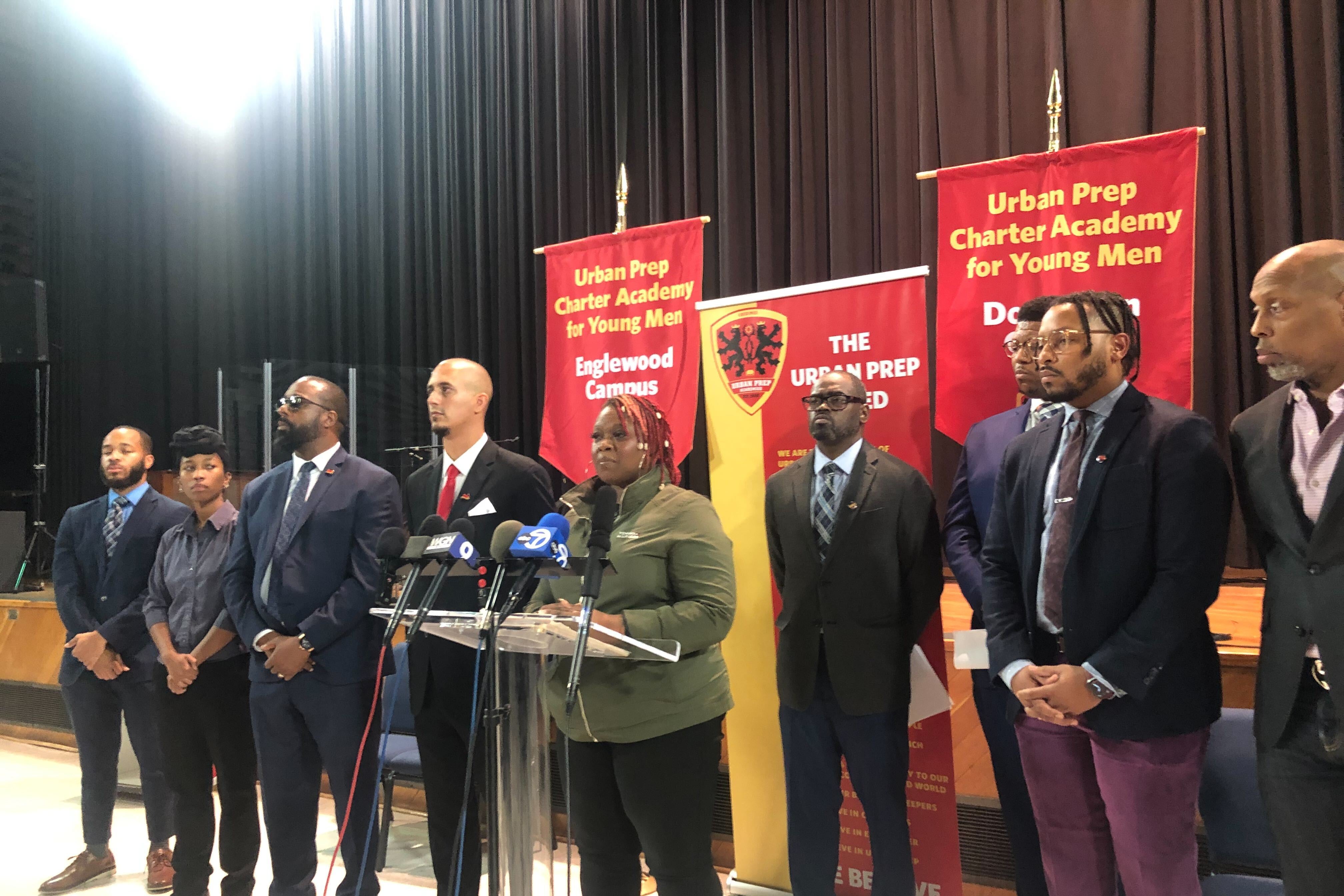Chalkbeat is a nonprofit news organization covering public education in communities across America. Sign up for Chalkbeat Chicago’s free daily newsletter to keep up with the city’s public school system and statewide education policy.
Urban Prep Academies may soon no longer operate public charter high schools in Chicago after state education officials denied the nonprofit’s appeal of a decision by the Chicago Board of Education.
The Illinois State Board of Education’s ruling could mean the end of Urban Prep’s 17-year run as a nationally-recognized charter school network known for serving Black boys.
But Urban Prep officials said late Wednesday that they filed a lawsuit in the Circuit Court of Cook County “asserting that the Chicago Public Schools has violated state law that there be a moratorium on school closings until 2025.”
However, the district is not planning to close the schools. In October, when the Chicago Board of Education voted to revoke Urban Prep’s charter agreement to operate campuses in Englewood and Bronzeville, district officials – in a nod to the network’s unique mission and model – promised to continue operating the schools under district management.
At the time, the Chicago school board cited the charter network’s mismanaged finances and its response to a sexual misconduct investigation involving Urban Prep’s founder, which were uncovered by a report by Chicago Public Schools’ Inspector General.
That report alleged that the charter network’s founder, Tim King, groomed an underage student who later worked at the nonprofit and continued to receive paychecks and benefits after he stopped working there. King denies the allegations.
Board chair Steven Isoye said after Wednesday’s vote that “critical steps are already in motion” to communicate with current students and families about the transition. He said Chicago Public Schools will operate a new school with two campuses and an advisory group is already working on transition plans. A district spokesperson confirmed that plan and said the campuses would remain at their current locations.
Two state board members — Donna Leak and James Anderson — abstained from voting on Urban Prep’s appeal.
“As an African American woman and the mother of an African American son myself, I know there’s a need for a safe space that provides them with the chance to know your value and not how you are portrayed in the media on so many occasions,” Leak said. “We have to do better for African American young men.”
Over the last several months, parents and school leadership have fought to keep all three campuses open and under the operation of Urban Prep Academies. The school’s website also appears to still be accepting applications for new students.
“We trust that the courts will rule in favor of justice and Urban Prep students and families,” the statement from Urban Prep read.
The state board had also voted in November to revoke a charter it held with Urban Prep for a third campus — which the state took over in 2019 after the charter network appealed a decision by Chicago’s school board to close that campus. That campus is slated to close at the end of this school year.
Dennis Lacewell, Urban Prep’s chief academic officer, told state board members their decision will impact 400 current students and “hundreds of elementary and middle school black boys” who will “lose the Urban Prep option.” He called the Chicago school board’s October decision “erroneous” and accused the district of “moving the goalposts” as the network tried to address concerns about financial mismanagement.
“A decision to close our schools would eliminate this black institution which almost 20 years ago took on a challenge to successfully educate the most neglected demographic of students: Black boys,” Lacewell said prior to the vote. He also said the decision could result in roughly 100 people losing their jobs, 85% of whom are Black.
Isoye said Chicago Public Schools is committed to retaining as many current Urban Prep staff as possible.
As part of the appeals process with the state, a hearing officer issued a full report for each school in February and recommended the appeals be denied. The reports outlined concerns about Urban Prep’s financial management, noting “extensive borrowing practices via credit cards and predatory lenders.”
It also highlighted a finding by Chicago Public Schools Inspector General that the charter network obtained a Paycheck Protection Program loan from the federal government that “made significant misrepresentations regarding the cost of its operations leading to the receipt of a loan larger than what it would have otherwise been qualified to receive.”
Last fall, Chicago school board members acknowledged that Urban Prep’s academic model has been successful for the Black teenage boys it serves. In the past, Urban Prep has received national recognition for graduating Black students at high rates and steering them into college.
The school’s leadership decided to appeal to the Illinois State Board of Education in November to prevent Chicago from taking over the schools.
After the vote, Isoye said the decision to deny Urban Prep’s appeal — effectively ending the once-lauded charter network — was “not an easy one to make.”
“Supporting the success of Urban Prep students through the transition and beyond is a top priority of all of us here,” Isoye said.
Mauricio Peña contributed to this report.
Samantha Smylie is the state education reporter for Chalkbeat Chicago, covering school districts across the state, legislation, special education, and the state board of education. Contact Samantha at ssmylie@chalkbeat.org.
Becky Vevea is the bureau chief for Chalkbeat Chicago. Contact Becky at bvevea@chalkbeat.org.





